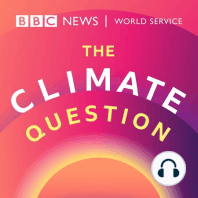27 min listen

Why is climate change fuelling tension in the Arctic?
Why is climate change fuelling tension in the Arctic?
ratings:
Length:
27 minutes
Released:
Feb 4, 2024
Format:
Podcast episode
Description
Global temperatures have already increased by around 1.3C above pre-industrial levels, but this warming is not spread evenly across the planet. The Arctic, despite being one of the coldest regions on Earth, has become a hotspot for global warming. Local temperatures there are rising as much as four-times faster than in other parts of the world. This rapid warming is unsettling the delicate environmental balance, causing significant ice loss – with implications for both the region and the wider world. In a previous episode on the Arctic region, Graihagh Jackson explored the impact that climate change was having on the people – and ice sheet – of Greenland. In the second part of The Climate Question's focus on the High North, she explores the implications of an increasingly ice-free region on global politics, military relations, and trade. Guests:
Mathieu Boulègue, consulting fellow at Chatham House and global fellow at the Polar Institute of the Wilson Centre
Julie Brigham-Grette, professor of Earth Sciences in the Department of Earth, Geographic and Climate Science at the University of Massachusetts Amherst
Malte Humpert, senior fellow at the Arctic Institute and journalist at High North News
Amund Trellevik, on-the-ground reporter in Norway Producer: Ben Cooper
Series Producers: Simon Watts and Alex Lewis
Editor: China Collins
Sound Engineer: Tom Brignell
Production Coordinators: Debbie Richford, Sophie Hill and Jacqui Johnson
Mathieu Boulègue, consulting fellow at Chatham House and global fellow at the Polar Institute of the Wilson Centre
Julie Brigham-Grette, professor of Earth Sciences in the Department of Earth, Geographic and Climate Science at the University of Massachusetts Amherst
Malte Humpert, senior fellow at the Arctic Institute and journalist at High North News
Amund Trellevik, on-the-ground reporter in Norway Producer: Ben Cooper
Series Producers: Simon Watts and Alex Lewis
Editor: China Collins
Sound Engineer: Tom Brignell
Production Coordinators: Debbie Richford, Sophie Hill and Jacqui Johnson
Released:
Feb 4, 2024
Format:
Podcast episode
Titles in the series (100)
Jakarta: A warning?: As sea levels rise due to global warming, what does the future hold for our coasts? by The Climate Question